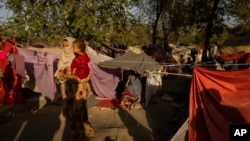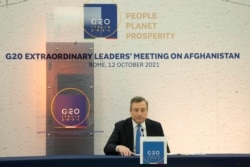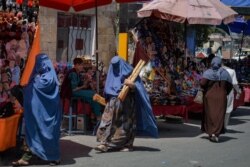Heads of government and foreign ministers from the world’s 20 leading economies — the G-20 — agreed at a video gathering Tuesday to look at ways to inject more cash into Afghanistan. The talks came after U.N. Secretary-General Antonio Guterres warned that the economy of the war-ravaged country, now under the control of the Taliban, is approaching humanitarian disaster.
“If we do not act and help Afghans weather this storm, and do it soon, not only they but all the world will pay a heavy price,” Guterres said in New York hours before G-20 leaders held an extraordinary meeting on Afghanistan, hosted by Italian Prime Minister Mario Draghi.
The meeting marked the first time the world’s richest nations had met to discuss the consequences of the U.S. withdrawal from Afghanistan and the Taliban takeover in August.
“Without food, without jobs, without their rights protected, we will see more and more Afghans fleeing their homes in search of a better life. The flow of illicit drugs, criminal and terrorist networks will also likely increase,” Guterres said.
As the G-20 meeting started, the secretary general tweeted: “Banks are closing and essential services, such as healthcare, have been suspended in many places. I urge the world to take action and inject liquidity into the Afghan economy to avoid collapse.”
His make-or-break warning was echoed by Draghi and other G-20 leaders during the summit. Italian Foreign Minister Luigi Di Maio said, “We must ensure that the state does not collapse.”
The European Union announced during the summit a $1.15 billion aid package for Afghanistan “to avert a major humanitarian and socioeconomic collapse.”
Leaders emphasized how precarious life is for the majority of Afghans. In addition to exploring how to provide urgent humanitarian support for the Afghan population, the leaders discussed the fight against terrorism and how to encourage the Taliban to allow freedom of movement inside the country and free passage for Afghans who want to leave.
The latest U.N. figures suggest that more than half a million Afghans have been displaced by fighting this year alone; almost 17 million are facing crisis levels of food insecurity; and nearly half of all children under five are malnourished as a consequence of conflict, drought and the coronavirus pandemic.
Aid halted, funds frozen
Before the Taliban seized control of the country on August 15, three-fourths of Afghanistan’s public expenditure came from other countries and international aid agencies. International aid accounted for 43 percent of Afghanistan's gross domestic product, and has done so for the past two decades.
But countries around the world have refrained from recognizing the Taliban government and international funds have been frozen as a result. The U.S. froze Afghanistan’s $9.5 billion dollars in reserves held in American banks after the Taliban's takeover of Kabul.
Until funds, and reserves, are unfrozen, it will be impossible to avert an economic disaster in Afghanistan. And that in turn will worsen the humanitarian crisis that’s unfolding and make for further misery for a population which has endured decades of violence and poverty, U.N. agencies and independent analysts have warned.
Last month, the World Health Organization estimated that less than one-fifth of the country’s public health facilities were functioning.
“We have to solve the humanitarian crisis, that’s the very first thing,” Draghi said at a press inference after the summit was over. He said the crisis was “enormous.”
“We need to keep the economy from collapse and to keep the banking system alive,” he said. He went through a list of what had been discussed, including how to provide relief for Afghan migrants and how to ensure Afghanistan doesn’t again “become a haven for international terrorists.”
The Italian leader told reporters human rights had been a key topic of discussion among the G-20 leaders. “Pretty much everyone focused on the rights of women. We have to make sure they have access to education. We mustn’t go back 20 years,” he said.
Caught in a dilemma
The international community is caught in a dilemma. “To recognize the Taliban risks condemning tens of thousands of Afghan women, children, and men to brutal repression and, for some, potential death, as well as mocking the human rights and rule of law which the U.S. and its allies sought to promote in Afghanistan, and globally, as cornerstones of values-based foreign policies,” says Renata Dwan, deputy director of Britain’s Chatham House research group.
“Formal recognition of a Taliban-led government is simply not an option, even for those maintaining a diplomatic presence in Kabul such as China, Iran, Pakistan, and Russia,” she says.
But not to inject cash into Afghanistan will push the reeling country into catastrophe.
In effect, the G-20 leaders Tuesday discussed how best to deal with the Taliban and find a way out of the dilemma — in short, how to pump money into Afghanistan while trying to cajole the Taliban to adhere to human rights obligations and not seem to be colluding in Islamist repression or endorsing the Taliban in any way.
One fundamental challenge, G-20 leaders debated, is how they can deliver aid without assisting the Taliban or allowing the group to manipulate it to serve their political purposes or to channel assistance to loyalists and deny it to minorities or opponents. G-20 leaders say the Taliban has done little to suggest they have changed or moderated their views toward women or dissent since they ruled most of the county in the second half of the 1990s.
As the leaders wrapped up the summit, Indian Prime Minister Narendra Modi posted on Twitter: “Participated in the G-20 Summit on Afghanistan. Stressed on preventing Afghan territory from becoming the source of radicalization and terrorism. Also called for urgent and unhindered humanitarian assistance to Afghan citizens and an inclusive administration.”
And in a tweet, Mark Rutte, the Dutch prime minister, said, “Just took part in a digital G-20 meeting, organized by Italy, on the situation in Afghanistan. We discussed a number of urgent issues, including the importance of free passage into and out of the country, unfettered humanitarian aid, security and human rights.”
Italy’s Di Maio told RAI Television that he had “asked for an increase in funds for international cooperation in aid of Afghan civilians.” He added, “We must ensure that the state does not collapse, because if Afghanistan collapses, we will see uncontrolled migratory flows toward neighboring countries, with consequent destabilization.”
He said, “We must find a mechanism to finance the state without giving money to the Taliban, to prevent it from having an economic meltdown.” Di Maio added he does “not believe that there is the possibility of recognition of this government” while “there is a government in Afghanistan that has about 17 members who appear on terrorist lists.”
“What the international community is asking the Taliban is to allow aid to be delivered without it going through the Taliban authorities,” according to Haroun Rahimi of the American University of Afghanistan. He says the Taliban have indicated they are interested in observing that condition.
But it wasn’t clear Tuesday, as the G-20 meeting concluded, whether any formal and detailed agreement about aid delivery has been reached with the Taliban. U.N. officials say cash could be injected into Afghanistan via U.N. trust funds and overseen by the international organization.
In Berlin, caretaker Chancellor Angela Merkel said Germany is not yet prepared to recognize the Taliban as Afghanistan's government since they have not met the inclusiveness standards demanded of them. But she reaffirmed Berlin's promise of $694 million in aid to the country.
America and the Taliban
U.S. diplomats met bilaterally with the Taliban Saturday in Doha, the first face-to-face talks with American officials since the Taliban took over Afghanistan. U.S. officials described the talks in the Qatari capital as “candid and professional,” with the American side focusing on security issues, including ensuring Afghanistan is not again used as a base by international jihadists, women’s rights and safe passage for all Afghans and internationals wanting to leave the country.
The Taliban called for international recognition of their government and an end to economic sanctions.
Speaking in Doha publicly, the Taliban’s foreign minister, Amir Khan Muttaqi, appealed to the world for good relations but avoided making any firm commitments on girls’ education despite international demands to allow all Afghan children to go back to school.
“The international community needs to start cooperating with us,” he said at an event sponsored by the Center for Conflict and Humanitarian Studies at the Doha Institute for Graduate Studies.
Kremlin conference
Draghi, whose country holds the rotating G-20 chair, struggled to bring the G-20 countries together for Tuesday’s extraordinary summit. Both Russia and China oppose Western plans to impose conditions on aid to Afghanistan. Neither Russian President Vladimir Putin nor Chinese leader Xi Jinping participated in Tuesday’s virtual meeting.
And breaking international ranks, the Kremlin has arranged a rival summit on Afghanistan scheduled for October 20. Pakistan, India and Iran have been invited to attend the Moscow conference.






